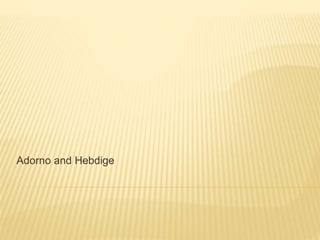
Adorno and Hebdige
- 2. ADORNO Adorno argued that capitalism fed people with products of a 'culture industry' which he believed is the opposite of 'true art'. False needs are cultivated in people by the culture industries. These needs are both created and satisfied by the capitalist system which replace people's actual true needs. This particular true and relevant in the music industry. Music products are commodities to be sold to an audience who believe they are consuming actual emotion. Products of culture industry may be emotional or apparently moving but Adorno suggests this is purely cathartic.
- 3. HEBDIGE However, Hebdige provides an opposing argument. He argues that consumption is an active choice made by the audience and particular needs differs according to audience's social and ideological construction. Furthermore, he believes that audiences are free to resist power of large companies by ignoring or finding alternatives. This then results to the audience making their own content and construct themselves as separate from the mainstream culture thus creating subcultures. Big companies will then tailor their products for subcultures and wider audiences which then results in the audience deciding to accept these products or resist further.